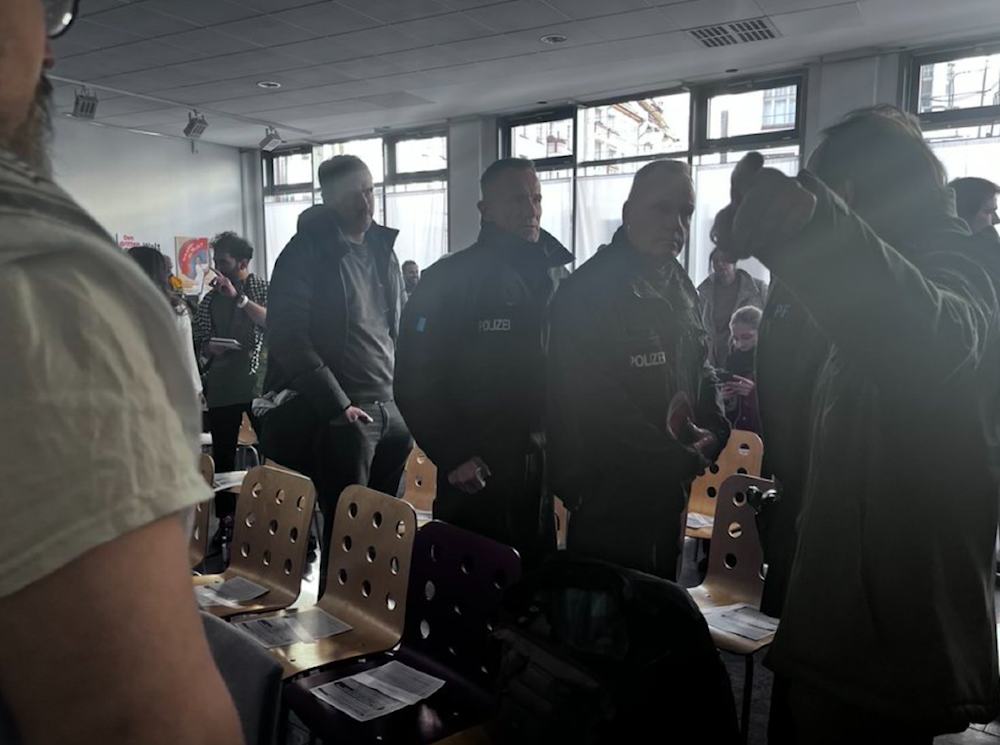German police crackdown on Palestine discourse events raises concern
German police disrupted pro-Palestinie events reinforcing their crackdown on all criticism of the Israeli occupation and raising concerns over free speech.
-

German police at a Palestine discourse event, on February 18, 2025 (X screengrab)
German authorities disrupted on February 18, 2025, events related to discussions about Palestine, which included UN Special Rapporteur Francesca Albanese. The initial site for an event titled 'Reclaiming the Discourse: Palestine, Justice, and Truth' was prohibited, forcing organizers to move.
Heavy police presence at the site, along with reported pressure on site owners where the events could be held, expose a desire to surveil and possibly intimidate visitors, triggering an international debate about free speech in Germany, particularly when it comes to the criticism of "Israel".
UPDATE: It's happening now. German police entered the new venue to intimidate our people who remain intent to meeting with Francesca Albanese and Amnesty International. The police miss no chance to prove that totalitarianism is back in Germany even before the AfD has won gvt pic.twitter.com/kkaD0qhmXE
— Yanis Varoufakis (@yanisvaroufakis) February 18, 2025
Social media posts on X show German police disrupting the new venue to intimidate people attending an event with the UN special rapporteur Francesca Albanese, who expressed "shock" regarding the situation, with some calling the police move as "totalitarianism" being back in Germany.
Albanese noted that she had never been in a place that received "so many threats," calling the situation "pretty awful" as police attempted to see if they could arrest her.
UN’s @FranceskAlbs says she is "shocked” about the German police interventions at a Palestinian event she is attending in Berlin.
— red. (@redstreamnet) February 18, 2025
Albanese called the situation in Germany "pretty awful” after police were checking if they could arrest her. pic.twitter.com/YCs2aBKjRr
Albanese joked that she could not wait to return to Tunisia, expressing she felt she "lacked oxygen" in Berlin amid the police presence and the lack of freedom of expression.
Germany is hellbent on shredding free speech to protect genocide, sending police to stop UN Special Rapporteur @FranceskAlbs from speaking after banning her events. Again they punish Palestinians for their own heinous crimes https://t.co/cG8J4IktpI
— Abby Martin (@AbbyMartin) February 18, 2025
Calling it one of the "most urgent issues of our time," she decried the denial of genocide in Gaza, saying it was essential that people remain aware of their role.
🗣️ German police entered a venue in Berlin to intimidate people gathered for an event to discuss Israel’s genocide of Palestinians, but despite the gov’s desperate attempts to silence dissent, @FranceskAlbs spoke truth to power, with style and fiery grace. pic.twitter.com/4ZuPzZwH9v
— Ahmed Eldin (@ASE) February 18, 2025
New German 'antisemitism' bill threatens academic freedom: Scholars
A group of renowned German professors has condemned legislators for a contentious resolution to allegedly combat antisemitism, claiming that it jeopardizes the country's academic freedom.
The German lower house of parliament passed the "Opposing Antisemitism and Hostility Towards Israel in Schools and Universities and Securing Free Discourse" resolution on January 30, despite strong opposition from university researchers, legal experts, and human rights organizations.
Professor Michael Zurn of the Berlin Social Science Center WZB sounded the alarm once more at a news conference in Berlin, saying the contentious antisemitic resolution might limit academic freedoms and criticism of the Israeli occupation's conduct.
According to Zurn, it not only "infringes on academic freedom" but also "formulates a German special path in the international discussion. And thirdly, it opens up possibilities for political influence."
The expert cautioned that such political meddling and academic restrictions would jeopardize German institutions and schools' worldwide connections, detailing how doctoral students and post-doc scholars would have to be vetted for their political ideologies before admitting them, something he said would "paint a strange picture of German academia."
The antisemitic resolution, which won widespread support from major political parties in the Bundestag, approved the International Holocaust Remembrance Alliance's (IHRA) definition of antisemitism.
It advocates for the exclusion of groups pushing boycotts against "Israel", such as the BDS (Boycott, Divestment, and Sanctions) movement, from German educational institutions.
The professor stated that he sees the resolution as a political intrusion in the academic world—a way to codify draconian constraints on academic freedom.
Professor Ralf Michaels of the Max Planck Institute also spoke out strongly against the new antisemitic resolution, accusing parliamentarians of failing to incorporate scholarly opinions and input throughout the writing process.
Michaels decried efforts to exert political pressure on the academic community and stated that, contrary to its claims, the motion "does not protect the Jews at all," particularly those who oppose Israeli actions.
He stated that "students demonstrating against Israeli policy … are already facing difficulties," and the new resolution limits Jewish students as well.
Read more: German Parliament passes controversial resolution backing 'Israel'

 4 Min Read
4 Min Read










